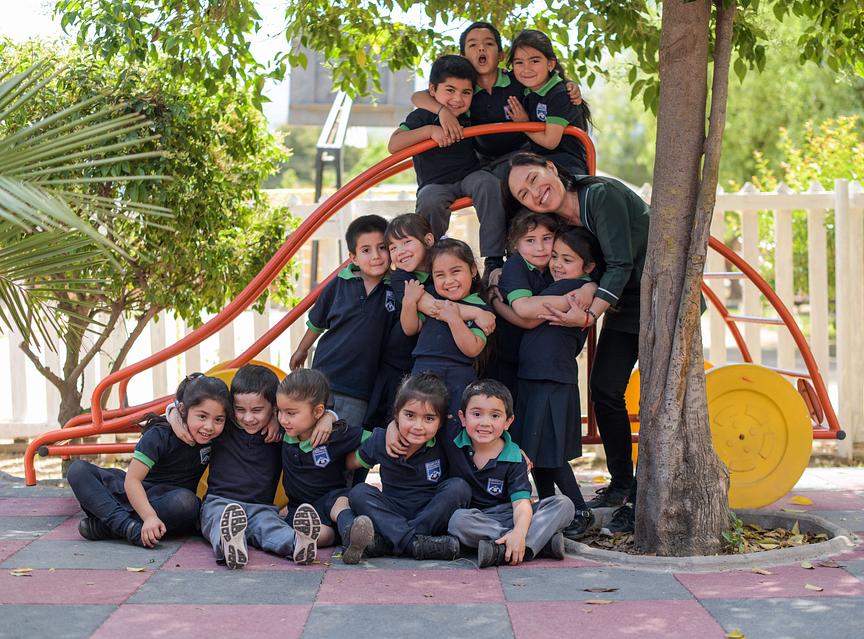We are Fundación Educacional Oportunidad, a Chilean NGO with 16 years of experience improving the quality of pedagogical and leadership practices in Early Childhood Education with a focus on language and socioemotional development through our program Un Buen Comienzo, which means "A good start".
What is the Un Buen Comienzo (UBC) Program?
The UBC model is based on three focal points that ensure children’s learning. The first one is to maximize the amount of time in which teachers are directly involved with children, teaching and developing their language skills. The second one is to foster effective interactions in the classroom. Last but not least, we work to ensure that children don’t miss any learning opportunities by promoting school attendance.
In order to do so, the UBC program focuses on providing professional development to teachers, aides and school leaders in everyday strategies that go from the visit from a “super attendance heroine” that motivates children to go to class, to implementing the steps needed to create meaningful learning experiences when reading a book out loud.
The Problem: Sustainability
By measuring the quality of teachers' pedagogical practices and children’s outcomes we know that the UBC program works, but how do we ensure that these practices continue after we leave schools? This is a problem for many intervention programs: the strategies and skills learned by school teams might disappear when the support of the external institution is not as strong.
Addressing this issue is important if we want to achieve significant and durable changes in the educational system. Local stakeholders must become protagonists, being able to develop capacities and become gradually responsible to generate and maintain improvements in their teaching and learning processes.
This challenge motivated us in 2018 to create a Improvement Network with over 60 schools that successfully completed the UBC program with the goal of sustaining the learned capacities, and also, to go beyond by continually sharing experiences, developing new ideas and improving collectively.
How Does the Improvement Network Work?
Our Improvement Network is based on four main lines of action:
-
Coaching sessions with school leaders are meetings in which we train school leaders to observe and provide feedback to teachers regarding the use of UBC strategies. In these meetings we want to empower leaders in pedagogical leadership, a key element to sustainability.
-
District meetings are instances in which school leaders, within a territorial district, meet to reflect and discuss the topics of Instructional Time, Attendance, Effective Interactions and/or Language Development, especially by analyzing the data obtained from the evaluation of each strategy.
-
Visits among Schools are meetings in which educational teams visit other schools to observe and learn how they are implementing their initiatives, discussing how these practices could benefit their work and be adapted to their own contexts
-
Learning Sessions are large-scale collaborative work meetings where all the members of the Network including teachers, aides and leaders from the different schools and districts get together and share results and lessons learned from the application of the strategies, discuss challenges and insights, and support each other in planning new interventions.
In our Learning Sessions you can find members from one school sharing with another what they have learned over the years, helping each other to define short- and long-term goals, supporting each other as they stride towards one common and clear goal: improving early learning experiences so that every child can build a bright future.
By doing this, we know that working as a Network is not more of the same: it is a different and updated paradigm where we recognize that innovation is not possible in isolated classrooms, that learning from each other is the foundation of improvement, and that motivation and excitement about what we do is highly contagious.
Study: "Un Buen Comienzo Improvement Network: a collaborative path to strengthen early childhood education in Chile"
In their study "Un Buen Comienzo Improvement Network: a collaborative path to strengthen early childhood education in Chile", authors Mauricio Pino Yancovic and Juan Pablo Valenzuela analyze the Un Buen Comienzo Network in order to deeply understand how it works and the effects it has on the schools and the school leaders, teachers, and educational professionals that benefit from it.
They defined some key learnings from the UBC Network that might help strengthen educational networks in Chile:
1. Collaboration: The definition and implementation of a clear and shared methodology is essential to generate and strengthen collaborative processes.
2. Professional Capital: The formation of community improvement teams, within the methodological and conceptual framework of continuous improvement, allows strengthening the professional capital of lidership and educational teams.
3. Depth: The knowledge produced and discussed on the network is shared and analyzed in schools, incorporating it into their school culture. With this, what happens in the network meetings has an impact on the learning and well-being of students.



